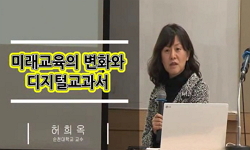목적 본 연구는 유아교사가 인식하는 디지털 역량에 대해 알아보기 위해 Q-방법론을 적용하여 유아교사의 인식을 유형화하고 유형별 특성을 분석하였다. 방법 이를 위하여 문헌분석과 Q표...
http://chineseinput.net/에서 pinyin(병음)방식으로 중국어를 변환할 수 있습니다.
변환된 중국어를 복사하여 사용하시면 됩니다.
- 中文 을 입력하시려면 zhongwen을 입력하시고 space를누르시면됩니다.
- 北京 을 입력하시려면 beijing을 입력하시고 space를 누르시면 됩니다.
https://www.riss.kr/link?id=A109134609
- 저자
- 발행기관
- 학술지명
- 권호사항
-
발행연도
2024
-
작성언어
-
- 주제어
-
KDC
373
-
등재정보
KCI등재
-
자료형태
학술저널
-
수록면
601-619(19쪽)
- DOI식별코드
- 제공처
-
0
상세조회 -
0
다운로드
부가정보
국문 초록 (Abstract)
방법 이를 위하여 문헌분석과 Q표본을 추출하기 위해 전북지역에 소재하고 있는 유아교육기관에 근무하는 유아교사 102명을 Q모집단으로 구성하여 개방형 설문조사를 실시하였다. 연구대상 102명 가운데 결측치를 제외한 총 98개의 Q모집단을 구성하였고, 범주화 과정을 거처 총 36개의 Q표본을 추출하였다. Q표본 추출 이후 현직 유아교사 36명의 P표본을 대상으로 Q표본 진술문을 분류하도록 하고, 36명의 P표본으로부터 수집한 자료는 강한 비동의 1점부터 강한 동의 9점까지 점수화하여 SPSS 29.0프로그램을 사용하여 요인분석을 실시하였다.
결과 연구결과 유아교사의 디지털 역량에 대한 인식은 4개 유형으로 구분되었다. 제 1유형은 디지털 시민성 및 이해를 기초로한 역량, 제 2유형은 디지털 안전을 기초로한 테크놀로지 활용 역량, 제 3유형은 디지털 테크놀로지 활용 협력과 소통 역량, 제 4유형은 디지털 책임과 권리에 기초한 학급 운영관리 역량으로 명명하였다.
결론 본 연구를 통해 유아교사의 인식 유형에 적합한 디지털 역량 강화 프로그램 및 교사 연수를 위한 기초자료로 활용할 수 있을 것으로 기대한다.
목적 본 연구는 유아교사가 인식하는 디지털 역량에 대해 알아보기 위해 Q-방법론을 적용하여 유아교사의 인식을 유형화하고 유형별 특성을 분석하였다.
방법 이를 위하여 문헌분석과 Q표본을 추출하기 위해 전북지역에 소재하고 있는 유아교육기관에 근무하는 유아교사 102명을 Q모집단으로 구성하여 개방형 설문조사를 실시하였다. 연구대상 102명 가운데 결측치를 제외한 총 98개의 Q모집단을 구성하였고, 범주화 과정을 거처 총 36개의 Q표본을 추출하였다. Q표본 추출 이후 현직 유아교사 36명의 P표본을 대상으로 Q표본 진술문을 분류하도록 하고, 36명의 P표본으로부터 수집한 자료는 강한 비동의 1점부터 강한 동의 9점까지 점수화하여 SPSS 29.0프로그램을 사용하여 요인분석을 실시하였다.
결과 연구결과 유아교사의 디지털 역량에 대한 인식은 4개 유형으로 구분되었다. 제 1유형은 디지털 시민성 및 이해를 기초로한 역량, 제 2유형은 디지털 안전을 기초로한 테크놀로지 활용 역량, 제 3유형은 디지털 테크놀로지 활용 협력과 소통 역량, 제 4유형은 디지털 책임과 권리에 기초한 학급 운영관리 역량으로 명명하였다.
결론 본 연구를 통해 유아교사의 인식 유형에 적합한 디지털 역량 강화 프로그램 및 교사 연수를 위한 기초자료로 활용할 수 있을 것으로 기대한다.
다국어 초록 (Multilingual Abstract)
Methods To this end, in order to analyze literature and extract Q samples, an open-ended survey was conducted with 102 early childhood teachers working at early childhood education institutions located in the Jeonbuk region as the Q population. Among the 102 research subjects, a total of 98 Q populations were formed excluding missing values, and a total of 36 Q samples were extracted through a categorization process. After extracting the Q sample, the Q sample statements were classified for the P sample of 36 current early childhood teachers. The data collected from the P sample of 36 people were scored from 1 point of strong disagreement to 9 points of strong agreement, and factor analysis was performed using the SPSS 29.0 program.
Results As a result of the study, early childhood teachers' perception of digital competencies was divided into four types. Type 1 was named competency based on digital citizenship and understanding, Type 2 was named competency to use technology based on digital safety, Type 3 was named cooperation and communication competency using digital technology, and Type 4 was class operation and management competency based on digital responsibility and rights.
Conclusions It is expected that this study will provide basic data for digital competency enhancement programs and teacher training suitable for early childhood teachers' perception types.
Objectives This study categorized the perception of early childhood teachers and analyzed the characteristics of each type by applying Q-methodology to find out the digital competencies perceived by early childhood teachers. Methods To this end, in...
Objectives This study categorized the perception of early childhood teachers and analyzed the characteristics of each type by applying Q-methodology to find out the digital competencies perceived by early childhood teachers.
Methods To this end, in order to analyze literature and extract Q samples, an open-ended survey was conducted with 102 early childhood teachers working at early childhood education institutions located in the Jeonbuk region as the Q population. Among the 102 research subjects, a total of 98 Q populations were formed excluding missing values, and a total of 36 Q samples were extracted through a categorization process. After extracting the Q sample, the Q sample statements were classified for the P sample of 36 current early childhood teachers. The data collected from the P sample of 36 people were scored from 1 point of strong disagreement to 9 points of strong agreement, and factor analysis was performed using the SPSS 29.0 program.
Results As a result of the study, early childhood teachers' perception of digital competencies was divided into four types. Type 1 was named competency based on digital citizenship and understanding, Type 2 was named competency to use technology based on digital safety, Type 3 was named cooperation and communication competency using digital technology, and Type 4 was class operation and management competency based on digital responsibility and rights.
Conclusions It is expected that this study will provide basic data for digital competency enhancement programs and teacher training suitable for early childhood teachers' perception types.
목차 (Table of Contents)
- Ⅰ. 서론
- Ⅱ. 연구 방법
- Ⅲ. 연구 결과
- Ⅳ. 논의 및 결론
- 참고문헌
- Ⅰ. 서론
- Ⅱ. 연구 방법
- Ⅲ. 연구 결과
- Ⅳ. 논의 및 결론
- 참고문헌
동일학술지(권/호) 다른 논문
-
- 학습자중심교과교육학회
- 유지혜(JiHye Ryu)
- 2024
- KCI등재
-
성장혼합모형을 적용한 교사-아동 갈등관계 변화 유형화, 영향요인 및 학교적응 차이 검증
- 학습자중심교과교육학회
- 김지윤(JiYoon Kim)
- 2024
- KCI등재
-
SNS 기반 영아기 자녀를 둔 아버지교육 프로그램 개발 및 효과
- 학습자중심교과교육학회
- 정숙향(Suk Hyang Jung)
- 2024
- KCI등재
-
위절제술을 받은 노인을 위한 식이요법 교육프로그램 개발 및 효과
- 학습자중심교과교육학회
- 전은정(Eunjeong Jeon)
- 2024
- KCI등재





 스콜라
스콜라






